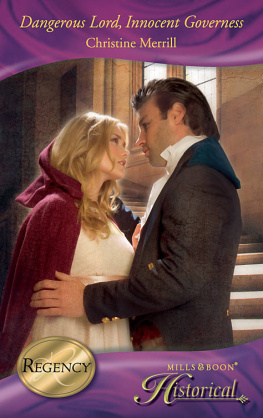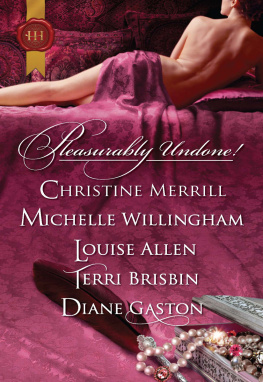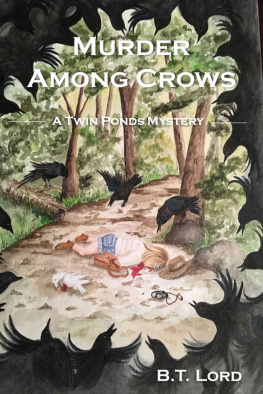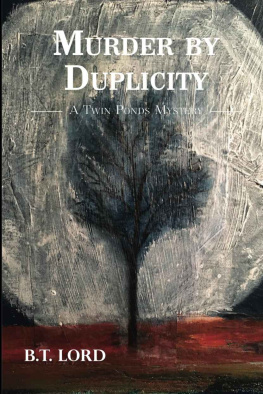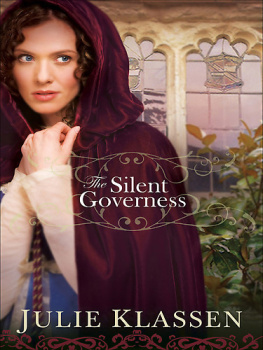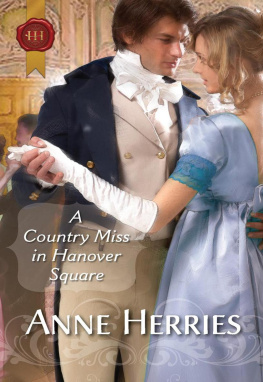Somewhere in the writing of MISS WINTHORPES ELOPEMENT, it became clear to me that I was only telling half the story. The more I wrote, the more I became convinced that there was another whole book that would explain the behaviour of Tim Colton and his wife Clare.
Perhaps Clare secretly had a heart of gold. Perhaps things werent as they appeared between her and the Duke of Bellston. Perhaps she only needed love, and if I gave them a little time Tim and Clare could work out their differences and live happily ever after.
Or perhaps not.
And as I wrote, I discovered that Id been leaving myself little clues as to how unhappy they really were together, and what might happen between the two of them once they were alone in Wales.
Once I stopped fighting the truth, the book all but wrote itself. My research became a weird mix: the nineteenth century, British horticulture, conservatory design, and old-fashioned gothic romances. The result was the story you are about to read.
To Jo Carr. May it always be this easy.
Chapter One

H er Grace will see you now.
Daphne Collingham followed the servant to the door of the sitting room, and took an involuntary breath as she was announced. Was it always this intimidating to seek employment? She certainly hoped she would never have reason to know.
Once her mission here was finished, she could return to her real life in London. And she would miss none of the Season: the parties, the balls and the tiresome chore of hunting up a husband who would meet with her fathers approval. But for now she must remember that she was a humble governess, whose only intent was to make a future in caring for the children of the Colton household.
She tried not to shudder at the idea.
Perhaps it was worse for her because she knew that her petition was a sham. And while it might be rather nerve racking to meet a duchess on a social occasion, it was much more so when the duchess stood as gatekeeper to a place one wanted to enter. Even more so when one was still trying to memorise an employment history that one had bought off a stranger on a northbound coach.
The Duchess rose as Daphne entered, which was entirely unnecessary, given their difference in class, and reached out to take her hand. Miss Collins.
Your Grace, she responded with what she hoped was appropriate subservience.
The Duchess sank back on to the divan, and gestured her to a nearby chair. The woman in front of her looked more like a schoolteacher than the wife of a peer. But looks could be deceiving. Daphne hoped that the Duchess believed the same, for she doubted very much that she was managing to look the part of a prospective governess. Her curtsy alone should have given her away. It would have suited in a drawing room, she suspected. But she had practised curtsying like a governess in front of a mirror at the inn, and could not seem to manage it.
The Duchess narrowed her eyes as Daphne bowed to her, as though she had recognised the deficiency. It had not been unfriendly. Merely a sign that the fact had been noted, recorded and filed appropriately. The Duchess of Bellston suspected she would prove difficult.
But now, the woman was examining her references, and smiling. These seem to be in order. Although they refer to you as Daphne. I understood, from your original letter, that your Christian name was Mary.
There was already a Mary in the last house, your Grace. So they called me by my middle name, Daphne. Ive grown to prefer it.
The Duchess nodded. Daphne. Very pretty. And it suits you much better than Mary.
She certainly hoped so.
The Duchess was reading more carefully. These are most exceptional.
Thank you. She had laboured long to erase the name of their previous owner, and insert her own. The fact that they were exceptional forgeries neednt enter into the conversation.
You have been in service long? There was a definite upturn at the end of the sentence, as though the Duchess had her doubts. Probably the fault of that damned curtsy.
When one enjoys ones work, the time passes quickly.
And you do enjoy your chosen profession, and are not doing it solely from duty, or a need to make a way for yourself?
I adore children. And there was the biggest lie of all. For while she hoped that she would manage to adore her own, she had never found the children of others to be better than a necessary evil.
Excellent, said the Duchess, eager to believe her. For that is just what this family needs. She looked at Daphne with the same searching expression she had used upon the paperwork. The residents of this house have undergone a loss, and the childrens behaviour has been somewhat she paused significantly difficult.
Difficult? Oh, dear. It had never occurred to her that the children would be part of the problem.
The Duchess smiled encouragement. But it will be nothing to someone as experienced as you. It is just that they will need more than rote learning and a firm hand. They need understanding. And affection, of course.
What they needed was justice. But Daphne nodded enthusiastically at the Duchesss words. The poor dears. One can never replace a mother, of course. But if it is possible to provide stability, and a womans touch? She gave a deprecating shrug. One tries.
The Duchess let out a visible sigh of relief. I think we are in agreement. While I place a high value on education, the Coltons are bright children, and naturally inquisitive. Advanced for their years.
Daphne nodded, as though she understood. It was strange that a woman who was little better than a neighbour should take such interest in another mans children. Perhaps she thought it her duty, as lady of the land. Or perhaps there was some other, more ominous reason that she felt a need to insinuate herself into the household.

